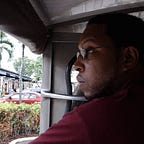Us: On new Black horror, and questions being as important as answers in our developing stories
I saw “Us” with my wife this past Friday, and came away with so many questions, so much hope, so much enthusiasm, copious motivation, and the right kind of impatient frustration.
I came away from the film unsettled, and glad for that.
Much of the best, lasting, and most profound art refuses to answer all of our questions. That same art will often demand that we retire to our subconscious spaces, and massage through the many layers of story and narrative and meaning it has gifted us with.
“Us” pitched layer upon layer at us, frantic and urgent, and I don’t know that I have fully processed my way through. I’m fine with this, as some of my favorite art requires that I return to it, for further assessment, as it, and I, mature.
Beyond this film bringing Black lives further into the horror genre of film, it brought much of our psychology into the genre, and that is where I found my interest soaring with “Us.”
What makes most horror so palatable to the masses is that there is so very little thematic complexity. There is a threat, typically killing in spree fashion, and a small band of brave souls who, after much trauma, eventually bring the threat low, only for it to resurface for revenge and more carnage in later sequels. “Us”, comes fully dressed without any of our known horror tropes. It cuts its way through a wilderness thematically, making horror as a genre little more than its canvas.
All at once, the film is using horror to meditate on the traumas visited on Black being, and how we are often willing to do whatever desperate things are necessary to avoid being further victimized and seen as fully Black, and how we cut and carve away parts of ourselves to better tether ourselves to Whiteness and Supremacy, and how we think of other Black minds and bodies as “them”, and villains in our personal fables, thus further distancing ourselves, and how we, with our nation family, see the monsters crafted around “their” beliefs, and the idea that we are really in search of the same things, and thus we are all emotionally just dopplegangers, and are one disturbed American family, and Black family, and may all kill to achieve our dream, and keep our fairy tale alive, and we must practice xenophobia to keep this chasing of the dream stabilized…so, so very much.
I found myself always saying, “what would I have done there”, and am still doing so, even now. I found myself hoping that I never mansplain and manexist like Gabe with his young Black family, and found that the closer this family came to its White counterparts, the more in danger they were in becoming them, and fighting to never become what overall White America believes young, and all, Black families, are.
The Psychologist in me found our lead, Adelaide, a compelling character study. I saw all the passion, all of the desperation, all of the urgent will, that all Black mothers everywhere employ to keep their families safe and happy.
This film, while a horror film, with hints of supernatural fiction, felt completely relatable. Like much great fiction, you had to come away and ask, “what if.” And were thus shaken, and frightened. Job done.
Beyond those higher themes, there were a few which attempted to hide from me, tethered to questions, left largely unanswered. and rightly so.
In thinking about our larger nation family, the question we should meditate on “how did we become this, and how did we get here”, with all of our greed, and raucous, and reliance and marriage to supremacy and cannibalizing of the vulnerable, and refusal to fully evolve and know our potential. “Us” was effectively, posing many of those questions. Why are we this way, and so like one another, though our narrative will never allow us to see those ties across those many human chasms.
I’ve seen many people, of all backgrounds, struggle with the film. People have largely either loved or disliked it. That may be the American psychology. We wish to christen a thing a magnificent beast or disdain a thing as it doesn’t meet with our need to have our stories wrapped up in a comfortable bow as we are exiting theaters, closing the book, stepping away from the frame or turning down the volume of the song.
Ultimately, what I enjoyed most about this film is that I still, several days later, have no urge to decide whether I liked, loved or loathed it. The story, the art, moved me so that I am still living with it. That is a rare experience for any of us to be confronted with when sitting with a piece of art, and yet, here it is. There is value to be had in finding new questions, and seeing a thing from an angle not previously considered. Art can intrigue us still, and that is healthy in the human condition.
What encourages me most about this film, is that there were no definitive statements about the Black human condition. There was so much diversity in the Black characters, and so much possibility. As we broaden and tell our own stories, in our voices, and with our own biases and means for reframing our lives in our spaces, this will need to be an essential skill set. Our many storytellers can look toward examples like these, in previously unexplored genres, and expand and press the boundaries outward. I find that energy boundless, and promising, and I am grateful for it.
If you haven’t yet seen “Us”, I would ask only that you approach the film with a sense of curiosity, and a sense that time and stories are continuous, and do not need to be solidly defined or confined. Our stories are, obviously, better told that way.
